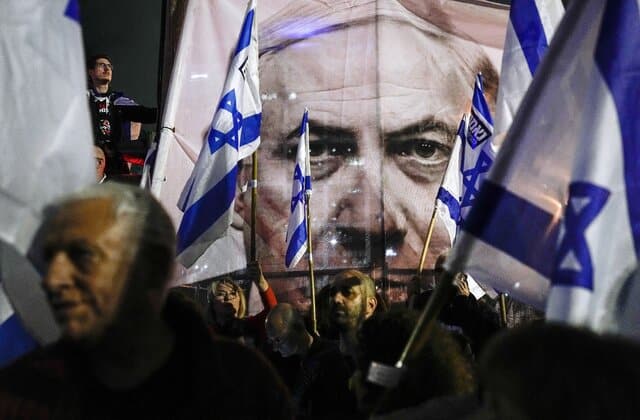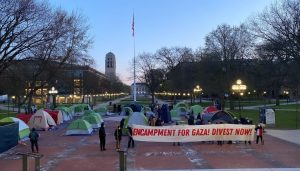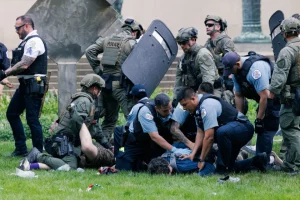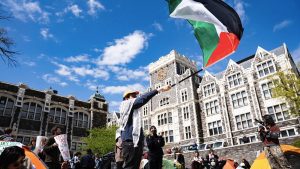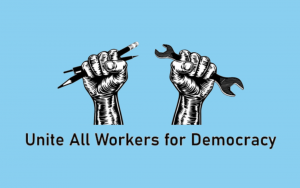For months, the State of Israel has been facing its greatest internal crisis in its 75-year history. Hundreds of thousands of people have taken the streets of Tel Aviv, Jerusalem, and other cities waving Israeli flags. A general strike shut down the airport for one day, while military reservists are refusing to report for duty. Prime Minister Benjamin Netanyahu has warned that the country is in danger of civil war.
The movement began in response to the government’s plans for a “judicial reform” — Netanyahu and his far-right coalition partners want to put the Supreme Court under the direct control of the Knesset, the Israeli parliament. This will allow them to implement their right-wing projects over objections by the courts. Demonstrators want to defend the independence of the judiciary, and more generally, democracy.
The U.S. commentator Thomas Friedman, an imperialist hawk and a passionate supporter of Zionism, has warned that the judicial reform means “The Israel We Knew Is Gone.” He praises the self-described “Jewish state” as the only democracy in the Middle East — but that could be lost without the “rule of law” represented by independent judges.
Paradoxes
This movement for “Israeli democracy” is paradoxical on many levels. The main demand is to make sure that the Supreme Court, an institution free of any democratic control, remains free of democratic control. As socialists have always argued, an “independent” judiciary has nothing to do with democracy. It’s the opposite: making judges independent of democratic control only serves to make them dependent on the ruling class. (The U.S. Supreme Court is offering a dramatic example right now: the further the judges are away from voters, the closer they are to right-wing billionaires.) As Friedman points out, it’s primarily investors (i.e. capitalists) who are concerned that Israeli courts function consistently, without pesky interference from democratic decision-making.
Israel’s Supreme Court might be a few millimeters to the left of the current government of millenarian religious fanatics. But that’s not because the sages in robes embody liberal principles. Again, it’s the opposite: in recent decades, Israeli society has lurched to the right. The court represents a balance of forces from several decades ago. And even so, it’s not particularly liberal. Less than two years ago, this “democratic” court waved through the Nation-State Law declaring that Israel was a “State of the Jewish People,” and not of its citizens.
As many pro-imperialist human rights organizations have pointed out, this kind of ethnic segregation, with “democracy” for one ethnic group, has a name: apartheid.
As Peter Beinart argued in the New York Times, the idea of “a Jewish and democratic state is in reality a contradiction.” Beinart continued, “Democracy means government by the people. Jewish statehood means government by Jews. In a country where Jews comprise only half of the people between the Jordan River and the Mediterranean Sea, the second imperative devours the first.”
The problem is not just within the Israeli citizenry, where there are roughly seven million Jews, with full civil rights, and two million Palestinians with Israeli passports, who are second-class citizens at best. Additionally, there are hundreds of thousands of immigrants with virtually no rights. Another two million Palestinians live in the open-air prison of Gaza, where they are regularly killed by Israeli missiles. Three million more Palestinians live under military occupation in the West Bank, with Israeli settlements cutting up their territory. Roughly four million Palestinians live outside of Israel’s borders, expelled by Zionist wars of dispossession in 1948 and again in 1967. Another basic demand of democracy is that Palestinians be allowed to return to their cities and towns of origin.
Former Israeli PM Ehud Olmert said back in 2007 that “equal voting rights” would mean that “the state of Israel is finished.” A noteworthy admission from the former head of a supposedly “democratic” state: the most basic democratic principles are in contradiction to the state’s fundamental character.
“Liberal” and “Socialist” Zionism
Today’s demonstrators for democracy are rightly concerned that Netanyahu’s government will attack LGBTQ+ rights, roll back women’s rights, arm fascist militias, and increase violence against Palestinians. Yet it is notable that they are calling for the Supreme Court — the least democratic institution of the state — to protect them from decisions by a majority of the electorate. The obvious democratic solution would be to extend voting rights to everyone in the country, regardless of nationality. But expanding democratic rights to all Palestinians would undermine the Zionist state itself. Democratic and Zionist principles are counterposed.
Israel has undergone a massive shift to the right since 1948. The founders of the Zionist state saw themselves as social democrats and atheists. For the first few decades, leftist parties held a majority in the Knesset. But this liberal consensus melted away, and in the most recent elections, the social democratic party Avoda collapsed to just four seats, while the leftist party Meretz was not even able to enter the parliament. A state once founded by Jewish atheists has been taken over by far-right religious zealots.
While Thomas Friedman mourns the slow disappearance of liberal Zionism, this liberalism was always an illusion. Going back to Theodor Herzl, the goal of the Zionist movement was to create a Jewish state in Palestine. While they liked to pretend to have discovered “a country without a people for a people without a country,” there was never any doubt that founding a Jewish state would require expelling the native population. This is what happened in 1948: during the Nakba, more than 700,000 Palestinians were driven from their homes. All factions of Zionism — the liberals, the social democrats, and even the self-described Marxists of Mapam — were active in this crime.
“Leftist” Zionism was always an illusion. They aimed to create a socialist society based on collective farms (Kibbutzim), while simultaneously driving out the indigenous population and maintaining ethnic homogeneity — a reactionary “socialism” if there ever was one. A state based on the systematic exclusion of non-Jews was always going to lead to ever-more reactionary forms of Jewish identity. The far-right ideologies we see today are the ultimate consequence of what Herzl and Ben Gurion set in motion — even if they would surely be horrified to see their corrupt, cynical, and fascist descendants.
“Liberal” Zionism was always about deploying humanistic phrases while carrying out colonization and ethnic cleansing. This false discourse was important to secure backing from the world’s imperialist hegemon: for the U.S. Department of State, Israel is an unsinkable aircraft carrier with which they can dominate the Middle East. The imperialists want their subordinates to sound humanistic. Today, however, Israeli fascists feel strong enough that they are willing to drop the slogans about human rights. They are speaking openly about what the Zionist state has always been based on: Jewish supremacy guaranteed by force of arms. Thus, despite what Thomas Friedman says, this is very much the Israel that we always knew.
Class Antagonism
While the State of Israel was always a capitalist society, at the beginning it had strong corporatist elements and even socialist phraseology. Besides the Kibbutzim, the Histadrut labor federation operated as a massive corporatist entity, acting both as a major employer as well as a labor union. The Jewish-Israeli masses reaped some benefits from the dispossession and exploitation of Palestinians, and wealth disparities among Jews remained relatively low. The more land that was stolen, the more food that could be grown, sold and consumed by Israeli society.
Over the course of 75 years, the State of Israel has seen the erosion of corporatist structures and the imposition of neoliberal policies. Histadrut, which once acted as the second largest employer and also “represented” a majority of the workforce, has been gutted. Starting in the 1980s, Israeli capital went on the offensive against workers. With austerity and free-market economics on the rise, Israeli workers have become increasingly polarized along class lines, as shown by the 2011 Israeli tent protests. In 2021, the Jerusalem Post reported that 17% of Israeli Jews live below the poverty rate. As CNN noted, “The U.S. and Israel have the worst inequality in the developed world.“ In Israel, the top 10 percent of wage earners making roughly 15 times more than the poorest sectors. Among Palestinians with Israeli passports, poverty rates are drastically higher, as they earn about 50% less than Israeli Jews.
The ongoing impoverishment of the Israeli masses and growing inequality is one of the underlying causes of Zionism’s current crisis. While Jewish workers enjoy the privileges of being the “chosen people” of a Jewish-supremacist system, their own interests are expressed less-and-less by mainstream political parties. Approximately 70 Israeli billionaires now lord their wealth over society, making the country one of the highest in terms of per-capita billionaires. Demoralized, angry, and lacking a socialist leadership capable of solving the region’s problems, many Israelis have moved right politically, scapegoating Palestinians for the shortcomings of the Zionist state.
This trend mirrors the rise of right-wing populism in the U.S., as decades of declining living standards have driven a sizable chunk of white America to blame immigrants, Blacks, LGBTQ+ people and other minorities for the deep-going social ills of society. Yet Israeli-Jewish workers have far more in common with their Palestinian class siblings than they do with the Zionist billionaires whose class holds power.
The Fight for an Anti-Zionist Movement
Like the working class of the United States, the Israeli-Jewish working class has been poisoned by decades of racist, nationalist indoctrination. While imperialist military subsidies help to prop up Israel’s permanent war economy, most Israelis benefit little from the unending conflict with neighboring countries. Israeli workers must ally themselves with the Palestinian national liberation struggle if militarism, ethnic cleansing, poverty and cultural antagonisms are to be overcome.
One highly progressive development within the recent protest movement is the formation of an Anti-Apartheid Block, which unites several hundred and sometimes several thousand activists at the demonstrations — a tiny minority, but a visible one. This “democracy” movement is being led by generals, spies, and right-wing politicians. At the same time, anti-Zionist activists wave Palestinian and communist flags, and point out that there can be no democracy based on Jewish supremacy. These brave actions deserve full support from socialists around the world. Yet it is no coincidence that they make up a small percentage of demonstrators. Palestinians, socialists, LGBTQ+ people and others face threats of verbal and physical attacks when taking protest action — both from far-right supporters of the government, but also from police and even protest organizers. And anti-Zionism remains a small minority view within Israel, just as true anti-imperialism remains a minority view in the U.S.
It is understandable that many Palestinians and anti-Zionist leftists are weary of the current “democracy” protests, which are full of Israeli flags, include major sectors of the bourgeoisie, and even elements of the security apparatus.
Democracy, Equality, and Socialism
Israeli Jewish workers are taught from an early age that antisemitism is so strong that Jews need their own nation-state to avoid persecution. Yet the State of Israel reinforces antisemitism by equating the Jewish people with the crimes of the Zionist state. Most Jews live outside the State of Israel, and growing numbers of Jewish youth are questioning Zionism and its crimes.
How can the masses of the region escape from the seemingly endless cycle of war and hatred? The millenarian forces believe that the world itself is only a few thousand years old, and are thus convinced that the conflicts between different religious sects are eternal. In reality, of course, the Israeli-Palestinian conflict is a result of imperialism and colonialism, and thus only about 100 years old.
What is needed is a real perspective of democracy. This means not only that every single individual in Palestine should have an equal say in politics. It goes far beyond that. For a century, the vast resources of the region have been ruthlessly exploited by imperialist powers. Real democracy means expropriating all imperialist corporations and putting this wealth under the control of the people. This would get rid of the main force that has installed reactionary dictatorships and played different religions and nationalities against each other to maintain control. This can only be achieved by revolutionary means and a socialist perspective.
The State of Israel proclaims that only an ethnically exclusive nation state can protect people from the threat of antisemitism, which has included the most horrific crimes in history. But the history of Zionism shows that the opposite is the case: the settler-colonial project of Israel puts Jewish people under constant threat. They are told to live in a large bunker in eternal conflict with hundreds of millions of people around them. In recent years, up to one million Israelis have gotten foreign passports — not a huge vote of confidence in the state.
As Jewish revolutionaries have argued for generations, the real way to end antisemitism is to abolish class society in a world revolution. This requires breaking from the reactionary nationalist idea of Zionism. Workers in Israel often enjoy immense privileges in comparison to their class siblings in the region. This is one factor in why these “democracy” protests have had so little resonance among the working and oppressed people of neighboring countries. Yet every ascent of the class struggle in the Middle East will see at least a minority of these Israeli workers swept along, ready to fight for a socialist transformation that will provide peace and democracy for everyone. This is exactly what happened with Israel’s new left after 1968, for example.
As socialists, we will do everything to support the Palestinian national liberation struggle, and break Israeli workers from Zionism to support that struggle. Trotskyists — in Palestine and internationally — have always fought for a socialist Palestine guaranteeing equal rights for all workers, regardless of nationality and religion.


